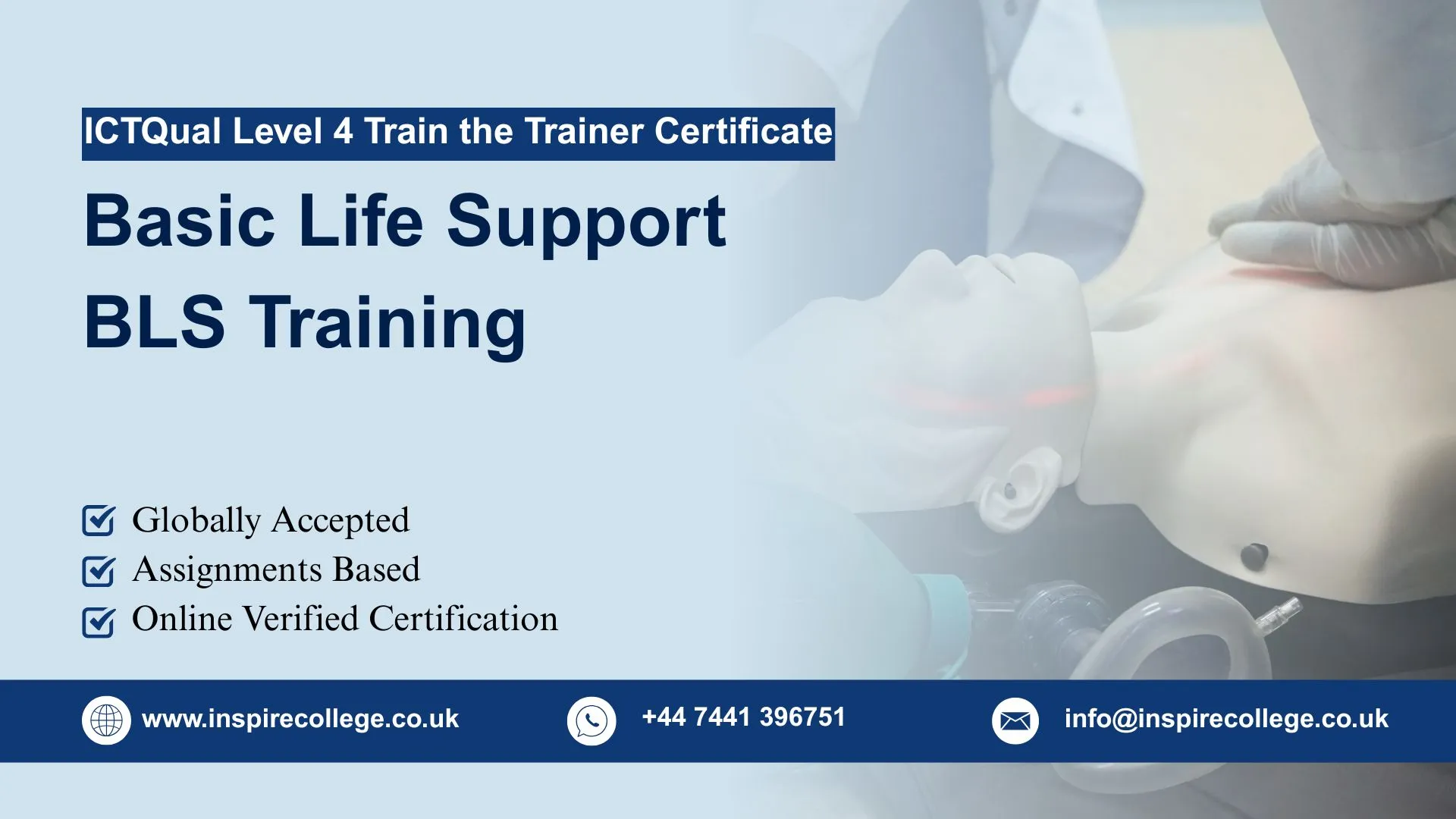
ICTQual Level 4 Train the Trainer Certificate in Basic Life Support BLS Training
In today’s fast-paced world, having the skills to save a life is crucial. The ICTQual Level 4 Train the Trainer Certificate in Basic Life Support (BLS) Training is designed for individuals who are interested in teaching BLS techniques and providing essential life-saving skills to others. This qualification equips professionals with the knowledge and expertise required to deliver high-quality BLS training and ensures that life-saving protocols are effectively communicated to both individuals and groups.
Basic Life Support is a set of life-saving techniques used in emergencies to keep a person alive until medical help arrives. It involves procedures such as cardiopulmonary resuscitation (CPR), managing airway obstruction, and other vital actions to stabilise a patient. BLS training is vital for individuals in various industries, including healthcare, education, and sports, to ensure they are prepared for emergencies.
The ICTQual Level 4 Train the Trainer Certificate is suitable for professionals who wish to become BLS instructors. This includes healthcare professionals, first aid trainers, teachers, sports coaches, and anyone in charge of training or instructing others in life-saving techniques. Additionally, individuals who are already skilled in BLS but want to enhance their teaching capabilities will find this course beneficial.
The Level 4 Train the Trainer Certificate in Basic Life Support BLS Training is a valuable qualification for those wishing to make a difference in emergency situations. It provides the essential knowledge and skills needed to teach life-saving techniques to others, ensuring that more people are equipped to respond effectively in critical moments. With this certification, individuals can become leaders in promoting safety and preparedness, making a significant impact on both their professional environment and the wider community.
To enrol in the ICTQual Level 4 Train the Trainer Certificate in Basic Life Support BLS Training, applicants typically need to meet the following criteria:
- Minimum age: Learner age must be 18 years old
- Educational background: A minimum of GCSE level or equivalent; prior knowledge of Basic Life Support is preferred
- Experience: Previous experience in healthcare, first aid, or training roles is advantageous but not mandatory
- English Language competency: Proficient in written and spoken English
Mandatory Units
The ICTQual Level 4 Train the Trainer Certificate in Basic Life Support BLS Training qualification consists of 6 units and 36 Credits for the complete qualification.
Mandatory Units
| Unit# | Unit Title |
| 1 | Principles of Teaching Basic Life Support (BLS) |
| 2 | Curriculum Design and Lesson Planning for BLS Training |
| 3 | Assessment Methods and Evaluating Learner Competency |
| 4 | Quality Assurance and Standardization in BLS Training |
| 5 | Facilitating Practical Demonstrations and Simulations |
| 6 | Ethical Considerations, Compliance, and Professional Development in BLS Training |
Upon successful completion of the ICTQual Level 4 Train the Trainer Certificate in Basic Life Support BLS Training, participants will be able to:
- Principles of Teaching Basic Life Support (BLS)
- Understand the fundamental principles and techniques of teaching Basic Life Support (BLS).
- Demonstrate the ability to deliver BLS instruction effectively to a range of learners.
- Apply teaching methodologies to enhance learner engagement and retention of life-saving skills.
- Curriculum Design and Lesson Planning for BLS Training
- Design a comprehensive BLS training curriculum that aligns with current guidelines and best practices.
- Create structured lesson plans that cater to different learning styles and ensure learning objectives are met.
- Develop clear and measurable learning outcomes for each BLS training session.
- Assessment Methods and Evaluating Learner Competency
- Apply a variety of assessment methods to evaluate the competency of learners in BLS techniques.
- Conduct practical and theoretical assessments to ensure learners demonstrate full competency in BLS procedures.
- Provide constructive feedback to help learners improve their skills and understanding.
- Quality Assurance and Standardization in BLS Training
- Understand the importance of quality assurance and standardisation in BLS training.
- Implement consistent training practices that adhere to national and international BLS guidelines.
- Monitor and evaluate training delivery to ensure it meets required standards and outcomes.
- Facilitating Practical Demonstrations and Simulations
- Facilitate realistic and effective BLS practical demonstrations to help learners apply their knowledge in simulated emergency scenarios.
- Use simulations and role-play techniques to reinforce BLS skills in an engaging and effective manner.
- Ensure learners are confident in applying BLS techniques in real-life situations.
- Ethical Considerations, Compliance, and Professional Development in BLS Training
- Demonstrate an understanding of the ethical considerations when delivering BLS training, including respecting learner confidentiality and dignity.
- Ensure compliance with legal and regulatory requirements for BLS instruction and certification.
- Promote continuous professional development by keeping up-to-date with changes in BLS guidelines and instructional practices.
The ICTQual Level 4 Train the Trainer Certificate in Basic Life Support (BLS) Training is a comprehensive programme aimed at individuals who wish to acquire the skills necessary to teach BLS techniques to others. This course requires a specific set of skills, experience, and personal qualities to ensure that learners are capable of both delivering high-quality instruction and performing BLS in real-life situations.
Key Characteristics of the Ideal Learner
- Professional Background: The ideal learner will have a background in healthcare, first aid, or any role where the ability to perform and teach BLS is essential. Those who already possess practical experience in BLS or emergency response will find this course particularly beneficial.
- Commitment to Lifelong Learning: A strong interest in continuing professional development is crucial. The ideal learner should have a desire to stay up-to-date with the latest guidelines and best practices in BLS training.
The ideal learner for this course is someone who not only possesses the technical knowledge of BLS but also has the passion and dedication to pass these life-saving skills on to others. Whether working in healthcare, education, or any sector where safety is paramount, the learner should be committed to improving their own skills and contributing to the professional development of others.
Register Now
FAQs for ICTQual Level 4 Train the Trainer Certificate in Basic Life Support BLS Training






